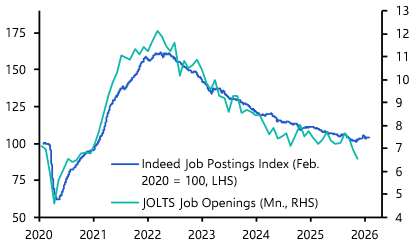Will new outbreaks of the coronavirus cause “double-dip” recessions? In truth, it’s impossible to say, not least because we don’t know what form any new outbreaks of the virus will take. Since we’re all Keynesians now, it’s worth bearing in mind that, in addition to establishing a framework for thinking about how governments can keep economies at full employment, Keynes also wrote extensively about what he called “fundamental uncertainty”. In his view, it was impossible to foresee some events prior to them happening. The evolution of coronavirus is a good example of this.
With all that being said, there are some things we can be reasonably sure about. One is that the effect of any new outbreaks on economic activity will depend on whether governments respond by re-imposing widespread lockdowns or, related, whether households and businesses respond with self-imposed lockdowns. This in turn will depend on several factors, including how widespread the outbreak is, how deadly it is, how quickly it is brought under control and whether healthcare systems can withstand the strain. In this sense, the economic consequences will be determined in large part by the nature of the outbreak and the effectiveness of the public health response.
So far different countries have had markedly different experiences. This in part reflects the ability of governments to identify and isolate new outbreaks. The responses to a spike in new cases in North Rhine-Westphalia in Germany and in Beijing were swift and outbreaks were brought under control using targeted local measures and without the need for wider lockdowns. The tracking, tracing and isolation of infected people was effective and popular compliance with containment measures was strong.
At the other end of the spectrum, having had initial success in containing the virus, Israel has subsequently had to re-impose lockdown restrictions in response to a spike in cases. The Netanyahu government has been roundly criticised for lifting restrictions and social distancing requirements too quickly in May, without having adequate systems in place to handle renewed outbreaks. Instead of a phased easing, Israelis were told by their prime minister to go out and “have fun”; the unbridled rush for restaurants, bars, beaches and schools has resulted in record daily infection numbers.
Most attention has, understandably, focussed on the Sun Belt states of the US, where outbreaks have pushed cases at a national level to record highs. For now, the high-frequency data we follow suggest that, while the US recovery may have stalled, it is not going into reverse. (See Chart.) This is because, while bars and restaurants have been shuttered in the most heavily affected regions, governors have managed to avoid resorting to wider lockdowns. One reason this has been possible has been that, while health systems are stretched, they have not yet been overwhelmed. Unlike in Europe and the North-East of the US earlier this year, the outbreak in the Sun Belt states seems to be affecting younger people, and death rates are lower.
Chart 1: Google Mobility Data (% difference from pre-virus level, 7-day MA)
 Sources: Google, Capital Economics
Sources: Google, Capital EconomicsThis illustrates how the economic impact of new outbreaks will depend in large part on the nature of that outbreak. The question for the US, and indeed other economies, is whether any new outbreaks sit at the relatively benign end of the spectrum or whether they take a more malign form, for example affecting more vulnerable groups or coming alongside the normal winter flu season when health systems are already under strain. Were this to happen, the risk of wider and stricter restrictions – and thus a double-dip recession – would increase markedly.
So where does this leave us? Keynes’ principle of “fundamental uncertainty” reminds us that much is simply unknowable. What we do know is that the economic effects of new outbreaks will depend on the specific characteristics of that outbreak and the ability of governments to contain the spread without imposing widespread restrictions on activity. This in turn will depend on factors like popular compliance with distancing rules and the effectiveness of the public health response, including the tracking, tracing and isolation of infected people. We also know that, while some of the pessimism about the longer term economic impact of the virus may be overdone, countries are unlikely to return to their pre-virus path of GDP until the virus has been stamped out, herd immunity established or a vaccine developed.
For all these reasons, good public health policy is good economic policy. As things stand, there are more reasons to be optimistic about the response of countries in Asia and parts of Europe than there are of the response in the US and many emerging economies.
In case you missed it:
- In the next few weeks, we will be upgrading our email system to ensure better and more reliable delivery of our research and data. There is a small chance that this results in our emails not reaching you if your corporate IT system doesn’t recognise us after the switch. To make sure that doesn’t happen, forward these instructions to your IT team.



